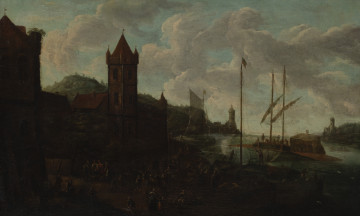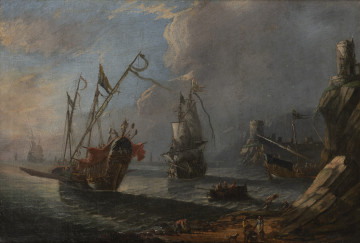
Scene in the harbour
1680 — 1700
National Museum in Szczecin
Part of the collection: European classics of modernity
Władysław Ślewiński is one of the most outstanding Polish Post-Impressionists. The National Museum in Szczecin holds his painting Morze [The Sea] from around 1901 when the artist lived in Le Pouldu in Brittany. The artist painted numerous pictures of the local coast at that time, which had a broader dimension for him. He treated it as a symbol of infinity, making it possible to talk about time and existence. These landscapes were characterised by a very simplified form and simple composition. On the canvas Morze, we can see a fragment of a quay - in the bottom right corner, there are rocks painted with a smooth contour line, only delicately outlining the shapes. They are created from patches of colour (browns, purples, blues and greens). This manner of depiction shows the inspiration of the works and assumptions of Ślewiński's friend - Paul Gauguin. Le Pouldu is the town where he moved at the end of June 1889. In the year when Ślewiński painted his landscape, the French painter was already living in Atuona (a town in French Polynesia on the island of Hiva Oa in the Marquesas group of islands).The sea is calm, and the sky is shown in a way that is not very different from it, which is one factor that evokes infinity. The mood this work evokes is melancholic.
Beata Małgorzata Wolska
Author / creator
Dimensions
cały obiekt: height: 57 cm, width: 82 cm
Object type
painting
Creation time / dating
Creation / finding place
Identification number
Location / status

1680 — 1700
National Museum in Szczecin

1600 — 1650
National Museum in Szczecin

circa 1930
National Museum in Szczecin
DISCOVER this TOPIC
National Museum in Lublin
DISCOVER this PATH
Educational path